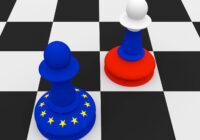The results of the European elections have revealed some breakthroughs for populists.
There is concern about the impact of populism on rational decision-making in many Western democracies. But there is no agreement on what “populism” means. All politics appeal — to some extent — to people’s self-interest and to their preference for advantages being given to themselves, the area in which they live or a group to which they belong.
The concern is not so much about this form of populism as it is about a populism that seeks to radically overturn the rules of the game by which conventional politics is played out. As the European Union is, above all, a rules-based organization, this form of populism represents a particular threat to the EU.
For example, by proposing in 2016 to leave the EU, British populists sought to change the rules of UK politics — rules that constrained what the United Kingdom could do, so as to protect the country’s relations with its neighbors.
In Poland, populists sought to overthrow the rules of Polish politics by challenging the independence of the national courts. Hungarian populists did something similar by dominating the media and defying EU policies on refugees. America’s populist president is seeking to overturn the rules of international trade by undermining the World Trade Organization and placing new tariffs on imports and withdrawing from nonproliferation and arms control treaties.
Generally, the existing rules that populists want to overturn are portrayed by them as benefiting an “elite” or foreigners, to the disadvantage of “the people.” By overturning these rules, the people are supposed to be allowed to “take back control.”
But there is often no underlying consensus about what to do with the control once it has been taken back. This is most obvious in the case of Brexit. Populists can articulate what they are against, but they generally fail to give equivalent detail on what they are for. If everyone pursues national self-interest, the conflicting national interests will cancel one another out.
Ray Dalio, the founder of the investment firm Bridgewater, has described populism as: “[A] political and social phenomenon that arises from the common man being fed up with 1) wealth and opportunity gaps, 2) perceived cultural threats from those with different values in the country and from outsiders, 3) the ‘establishment elites’ in positions of power, and 4) government not working effectively for them. These sentiments lead that constituency to put strong leaders in power.”
He adds: “Populist leaders are typically confrontational rather than collaborative and exclusive rather than inclusive. As a result, conflicts typically occur between opposing factions (usually the economic and socially left versus the right), both within the country and between countries. These conflicts typically become progressively more forceful in self-reinforcing ways.”
The results of the European elections have revealed some breakthroughs for populists in France, the UK, Italy, Hungary, Slovakia and Poland. But they have suffered setbacks in Germany, the Netherlands, Spain, Austria, Denmark and Ireland (Sinn Fein losses). The center has held, but its composition has changed. Greens and liberals have made gains, while classic Christian democrat, social democrat and conservative parties have lost some ground, although they remain dominant.
The biggest difficulties will be in EU relations with the UK and Hungary, where radical populists won large mandates. One has to ask whether the political culture of these countries is such that they belong in the European Union at all.
The views expressed in this article are the author’s own and do not necessarily reflect Fair Observer’s editorial policy.
Support Fair Observer
We rely on your support for our independence, diversity and quality.
For more than 10 years, Fair Observer has been free, fair and independent. No billionaire owns us, no advertisers control us. We are a reader-supported nonprofit. Unlike many other publications, we keep our content free for readers regardless of where they live or whether they can afford to pay. We have no paywalls and no ads.
In the post-truth era of fake news, echo chambers and filter bubbles, we publish a plurality of perspectives from around the world. Anyone can publish with us, but everyone goes through a rigorous editorial process. So, you get fact-checked, well-reasoned content instead of noise.
We publish 2,500+ voices from 90+ countries. We also conduct education and training programs
on subjects ranging from digital media and journalism to writing and critical thinking. This
doesn’t come cheap. Servers, editors, trainers and web developers cost
money.
Please consider supporting us on a regular basis as a recurring donor or a
sustaining member.
Will you support FO’s journalism?
We rely on your support for our independence, diversity and quality.






